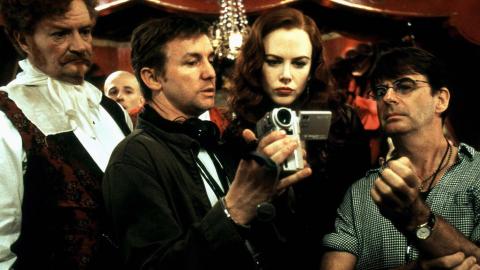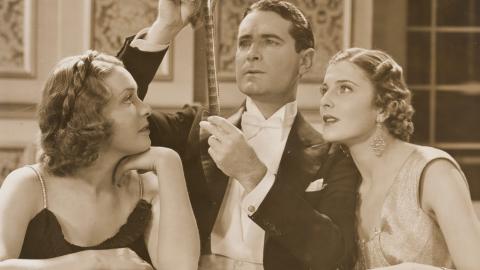

Vale Daphne Campbell
Oral History manager Ken Berryman farewells the star of the 1946 Australian epic The Overlanders, Daphne Campbell, who passed away on 15 October 2013 at the age of 89.

My first connection with Daphne Campbell – apart from, like many thousands of other cinemagoers, being totally entranced by her performance in the Ealing feature The Overlanders (1946) – came in 1993. At that time, I was coordinating retrospective screenings of the Australian-made Ealing films in seven capital cities during August and September of that year. These screenings were held as part of the Third Australian Film Festival, the retrospective component of which was jointly presented by the NFSA and the Australian Film Institute.
Although these films were essentially ‘off-shore’ productions, they were warmly received by contemporary audiences and applauded for their representations of history, national traits, and the ‘Australian identity’. This retrospective gave audiences around the country a chance to reassess, or to view for the first time, these distinctive post-war films. Brand new copies of newsreels, filmed at the time of The Overlanders Australian release, were included as part of the Archive’s ‘Operation Newsreel’ project.
I had always wondered why somebody with such a vibrant screen presence as Daphne Campbell did not go on to a stellar film career, and what had become of her post- The Overlanders. In discussing publicity for these screenings at the time with the NFSA’s Operation Newsreel Manager, Annice Vass, I mused how good it would be if we could find Daphne and, if possible, involve her in the Ealing film presentations.
At that time also, the NFSA had a regular ‘This Week in the Newsreel’ segment on ABC Radio around Australia, and Annice used this as a vehicle to send out an SOS – “Does anyone know the whereabouts of Daphne Campbell?” The response was amazing, and people who knew Daphne rang in from all over Australia, alerting us to her current whereabouts (Alice Springs) and providing contact details. The hope was that an airline sponsorship could be brokered, and Daphne – if she were agreeable – would be flown to the Adelaide and Melbourne screenings of The Overlanders as special guest of the Festival.
In the event, this proved not possible, but it gave me the chance to speak to Daphne by phone for the first time and she did kindly consent to assist publicity for the screenings by undertaking some radio interviews prior to them. One of these was with ABC 774’s Jon Faine in Melbourne and, in listening to this interview and being struck by Daphne’s gracious responses and strong recall of the arduous production shoot, it seemed to me a no brainer that the NFSA should seek a fuller oral history interview with her. But where? And how?
One of the callers who responded to our original SOS was an Anglesea-based resident, an old friend of Daphne’s who alerted us to the fact that Daphne’s daughter, Diana, a professional photographer at that time resident in Melbourne, had actually attended our Melbourne Overlanders screening. In following up directly with Diana, I asked if she thought her mother would agree to a full interview for inclusion in the national collection and, if so, could she (Diana) let us know anytime Daphne was in Melbourne to visit her daughter.
Diana did just that – sending me a note in early March 1996 to advise that her mum was now in town – “… she looks magnificent and is in top form’ – and indeed she did, when I arrived at Diana’s residence in Gardenvale to record Daphne’s interview for the NFSA. It was worth the wait. Despite my own nervousness, Daphne was every bit as charming and enlightening as she had been in her radio interview, and her story was equally fascinating.
She spoke freely about how she came to win The Overlanders role and described in vivid detail the logistics and difficulties of the location shoot around Alice Springs and the Roper River. Her views of the completed film and its impact were equally revealing, but the highlight for me was in learning what came next – her whirlwind romance and marriage to Sam Calder, who she met while filming on location, his political career in the Northern Territory and her involvement in this, and their life together on a northern cattle station.
One of the great privileges in working for the NFSA is the opportunities it provides to meet people like Daphne who have made such a singular contribution to our media heritage. After completion of her interview and return to the Alice, Daphne and I became frequent correspondents – and I very much looked forward to receiving her hand-written letters and news of her life in her beloved red centre, the envelopes often including dried leaves and flowers from some of her favourite local flora.
I was also fortunate through this connection in intersecting with some members of her immediate and equally impressive family – daughters Diana and Erika – and son in law David Woodgate who has also been interviewed for the Oral History Program in his own right.
Daphne will be sadly missed, but not easily forgotten. Her and her family’s generous donation of related memorabilia – including her own annotated copy of The Overlanders shooting script, stills, clippings and other material will also help ensure that her media legacy and memories are preserved for posterity in the national collection.
We’ve published the one-hour Oral History interview Ken did with Daphne in 1996. It is available on our SoundCloud channel:
The National Film and Sound Archive of Australia acknowledges Australia’s Aboriginal and Torres Strait Islander peoples as the Traditional Custodians of the land on which we work and live and gives respect to their Elders both past and present.


